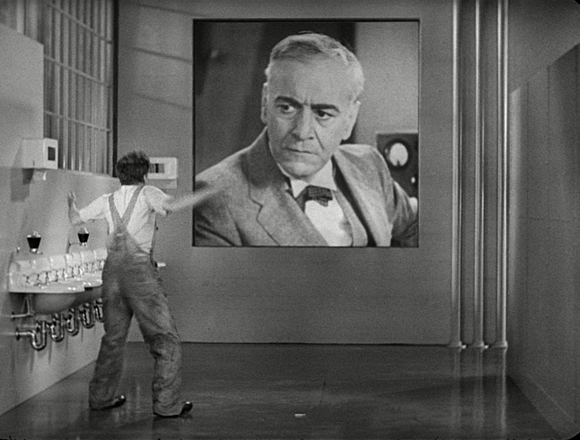modern times

It must have been four, five, or more years ago, when I had a conversation on the anthropology of work with one of my three teachers, ↑Kurt Beck. Somewhere into our talk Kurt mentioned Chaplin’s ‘↑Modern Times‘ (1936), associating the famous scenes of Chaplin at the assembly line with instances of workers ‘fighting against the conveyor belt,’ described in ethnographies of work. The gist was that workers at assembly lines by their practices not necessarily do fight metaphorically against their bosses, or even commit sabotage. Happens, of course, but isn’t always the case. Rather they actively ↵appropriate the technological artefact called assembly line by developing adequate strategies and tactics, or even stage contests with or against the machine—which introduces the elements of game and play.
Now to something completely different.
Swiss historian of technology ↑David Gugerli has written a fabulous paper called ‘Kybernetisierung der Hochschule: Zur Genese des universitären Managements’ (Higher-Ed’s cybernetification: On the genesis of university managements [my translation, put the blame on me]), which is more than enlightening, especially for everybody working at a university. In the end Gugerli hints (2008: 439) at the so-called ↑Bologna process, Europe’s effort to convert every course of studies found on the continent into a BA/MA-system. I am a witness (Knorr 2008), that the implementation of the Bologna process, as it really happened, and still happens, not as it was planned at the green table, indeed is the culmination of a bureaucratic steering- and regulation-craze—cybernetics’ heritage.
Way more enjoyable is Gugerli’s article and the way he begins it … by referring to ‘Modern Times.’ In Chaplins satirical caricature of modernity, Gugerli writes, the appearance of a ‘manager’ was an absolute necessity. After all the academic work on ‘scientific management,’ ‘time-motion,’ and ‘rationalisation’ from the 1910s, the manager had become the embodiment of modernity’s culture of governing and controlling. The manager depicted in ‘Modern Times’ demonstrates his obtrusive technocratic orientation, enhances his productive efficiency by medication, drugs, that is, and his space of interaction is augmented by technical media. He is the omnipotent and omnipresent surveillant and decision-maker. (Gugerli 2008: 414)
… in a nutshell: Chaplin’s ‘Modern Times’ is a cyberpunk flick.
The workers can’t even go to the lavatory and have a cigarette there, without being followed by the larger-than-life projection of the manager, shooing them back into the production process. (Gugerli 2008: 414) See the screenshot above: Orwellian imagery at its best—more than a decade before Orwell’s ‘Nineteen eighty-four’ (1949) saw the printing press.
P.S.: ↵By the way, the estimated budget of ‘Modern Times’ was US$ 1.5 millions, ↑equalling US$ 23.8 millions today.


So the Metropolis budget would be equal to $56,954,224.14 nowadays?? Where did you get that cal from, zeph? Pretty cool!
calc..not cal..sorry
What I did: Wikipedia says that the estimated budget for ‘Modern Times’ is US$ 1.5 millions. I threw that into the CPI Inflation Calculator (linked in the post), and out came approximately US$ 23.8 millions for 2011.
yes..sorry for my abbreviation, zeph..With calc I meant calculator, not calculation *haha* but thank you!
grtX!
Ah, lol, now I got it—happens that I am slow at decyphering abbreviations. Seldomly so, but happens ;-) The calculator is maintained by the Bureau of Labor Statistics of the United States Department of Labor. It’s in my bookmarks, but I can’t remember how I found it. Must’ve been quite some time ago when I first stumbled upon it. In fact the bookmark I had was outdated, but I found the current version by a quick search.